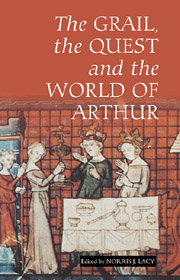Book contents
- Frontmatter
- Contents
- List of Illustrations
- Notes on Contributors
- Foreword
- Introduction: Arthur and/or the Grail
- 2 The Shape of the Grail in Medieval Art
- 3 The Crusaders' Grail
- 4 Bounds of Imagination: Grail Questing and Chivalric Colonizing in Wolfram von Eschenbach's Parzival
- 5 The Land without the Grail: A Note on Occitania, Rigaut de Barbezieux and Literary History
- 6 Female Desire and the Quest in the Icelandic Legend of Tristram and Ísodd
- 7 Questing in the Middle Dutch Lancelot Compilation
- 8 Keeping Company: Manuscript Contexts for Reading Arthurian Quest Narratives
- 9 Grail and Quest in the Medieval English World of Arthur
- 10 Malory and the Grail: The Importance of Detail
- 11 Glastonbury, the Grail-Bearer and the Sixteenth-Century Antiquaries
- 12 The Grail Quest: Where Next?
- Appendix: The Grail on Film
- Index
- Analysis of grail scenes
- Arthurian Studies
8 - Keeping Company: Manuscript Contexts for Reading Arthurian Quest Narratives
Published online by Cambridge University Press: 05 February 2013
- Frontmatter
- Contents
- List of Illustrations
- Notes on Contributors
- Foreword
- Introduction: Arthur and/or the Grail
- 2 The Shape of the Grail in Medieval Art
- 3 The Crusaders' Grail
- 4 Bounds of Imagination: Grail Questing and Chivalric Colonizing in Wolfram von Eschenbach's Parzival
- 5 The Land without the Grail: A Note on Occitania, Rigaut de Barbezieux and Literary History
- 6 Female Desire and the Quest in the Icelandic Legend of Tristram and Ísodd
- 7 Questing in the Middle Dutch Lancelot Compilation
- 8 Keeping Company: Manuscript Contexts for Reading Arthurian Quest Narratives
- 9 Grail and Quest in the Medieval English World of Arthur
- 10 Malory and the Grail: The Importance of Detail
- 11 Glastonbury, the Grail-Bearer and the Sixteenth-Century Antiquaries
- 12 The Grail Quest: Where Next?
- Appendix: The Grail on Film
- Index
- Analysis of grail scenes
- Arthurian Studies
Summary
… Nat yore
Agon it happede me for to beholde
Upon a bok, was write with letters olde,
And therupon, a certeyn thing to lerne,
The longe day ful faste I redde and yerne.
(Chaucer, ‘Parliament’ 17–21)Like Chaucer's narrator, we too look eagerly upon books written with old letters: one of the characteristics of current research in medieval studies is a renewed attention to the manuscript book as a material object whose physical structure, ink, parchment or paper, sequence of adjacent texts, annotations and other traits can constitute guides to the cultural roles that the book played and to questions of ownership, readership and interpretation. To mention just two examples, much has been learned about the circulation and transmission of Arthurian historiography, as in Lister Matheson's study that inventoried the more than 240 manuscripts of the Prose Brut, catalogued most of them in detail, and sorted out the versions; and many individual manuscripts have been shown to preserve information from which the interests of medieval readers can be inferred, as in Elizabeth Bryan's analysis of the red lettering, including faint traces newly recovered, that reveals a rubricator's marking of ‘potentially sensational Arthurian material especially surrounding Guinevere’ in the Otho manuscript of LaƷamon's Brut. But much remains to be done, and in this paper I should like to explore the use of manuscript evidence in interpreting Arthurian narratives of questing, especially in the English historiographical tradition.
- Type
- Chapter
- Information
- The Grail, the Quest, and the World of Arthur , pp. 109 - 125Publisher: Boydell & BrewerPrint publication year: 2008



